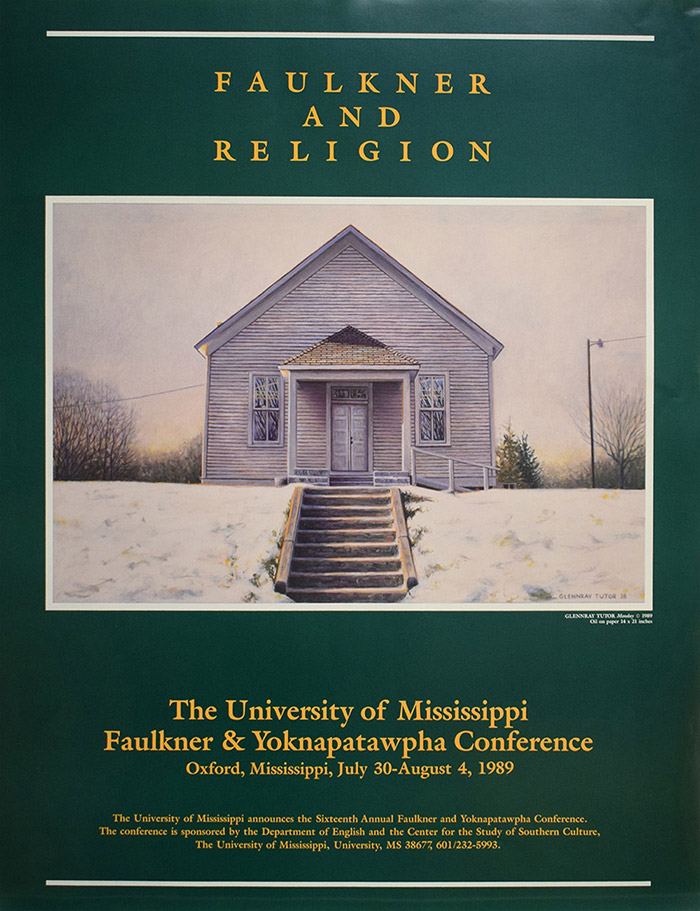
Quentin as Redactor: Biblical Analogy in Faulkner's Absalom, Absalom!
Location
Education Auditorium
Start Date
2-8-1989 9:00 AM
Description
Faulkner uses a biblical parallel for the narration as well as the narrative of Absalom, Absalom! Like the extended story of the House of David, the story of the House of Sutpen is assembled from various oral traditions, is told in a context of national defeat and humiliation, and involves several generations of redactors. Quentin’s role as narrator parallels that of the post-Exilic biblical redactors; the destruction of Jerusalem and the Babylonian Exile are paralleled by the defeat of the South and Quentin’s sojoutn at Harvard. The book’s several narrators bring attitudes toward their story like the attitudes toward history of the major strands of the Bible. Miss Rosa speaks with the voice of Prophetic History and in the role of Deborah, Miriam, and the barren and bereaved female figures in the prophets; Mr. Compson’s stance is that of the Wisdom literature; Quentin and Shreve’s new insights parallel those of post-Exilic Apocalyptic and Messianism. The redactions move from embittered partisanship through historical agnosticism to acceptance of self-sacrifice in the name of a larger community.
In the telling of the story, as in the story itself, Faulkner’s biblical parallels act as synecdoche: they represent, echo, and confirm parallels from other traditions rather than excluding or contradicting them. As to Faulker’s knowledge of biblical scholarship, the situation of Southern intellectuals in the 1930s, together with Faulkner’s extra-literary comments about the Bible and his use of the Bible in his fiction, make it highly likely that he was aware of such concepts of the Higher Criticism as the documentary theory of the origin of the Penteteuch and the evolutionary theory of biblical theology. Finally, the kinds of questions asked about Absalom in much current criticism find natural answers in a context of Faulkner’s thinking of his novel as a reperformance of the biblical process.
Relational Format
Conference Proceeding
Recommended Citation
Meeter, Glenn, "Quentin as Redactor: Biblical Analogy in Faulkner's Absalom, Absalom!" (1989). Faulkner and Yoknapatawpha Conference. 15.
https://egrove.olemiss.edu/fy/1989/schedule/15
Quentin as Redactor: Biblical Analogy in Faulkner's Absalom, Absalom!
Education Auditorium
Faulkner uses a biblical parallel for the narration as well as the narrative of Absalom, Absalom! Like the extended story of the House of David, the story of the House of Sutpen is assembled from various oral traditions, is told in a context of national defeat and humiliation, and involves several generations of redactors. Quentin’s role as narrator parallels that of the post-Exilic biblical redactors; the destruction of Jerusalem and the Babylonian Exile are paralleled by the defeat of the South and Quentin’s sojoutn at Harvard. The book’s several narrators bring attitudes toward their story like the attitudes toward history of the major strands of the Bible. Miss Rosa speaks with the voice of Prophetic History and in the role of Deborah, Miriam, and the barren and bereaved female figures in the prophets; Mr. Compson’s stance is that of the Wisdom literature; Quentin and Shreve’s new insights parallel those of post-Exilic Apocalyptic and Messianism. The redactions move from embittered partisanship through historical agnosticism to acceptance of self-sacrifice in the name of a larger community.
In the telling of the story, as in the story itself, Faulkner’s biblical parallels act as synecdoche: they represent, echo, and confirm parallels from other traditions rather than excluding or contradicting them. As to Faulker’s knowledge of biblical scholarship, the situation of Southern intellectuals in the 1930s, together with Faulkner’s extra-literary comments about the Bible and his use of the Bible in his fiction, make it highly likely that he was aware of such concepts of the Higher Criticism as the documentary theory of the origin of the Penteteuch and the evolutionary theory of biblical theology. Finally, the kinds of questions asked about Absalom in much current criticism find natural answers in a context of Faulkner’s thinking of his novel as a reperformance of the biblical process.

